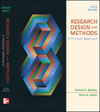 |  Research Design and Methods: A Process Approach, 5/e Kenneth S. Bordens,
Indiana University/Purdue University - Fort Wayne
Bruce Barrington Abbott,
Indiana University/Purdue University
Chapter 2 OutlineSources of Research Ideas
Unsystematic observation
Systematic observation
Theory
The Need to Solve Practical Problems
Developing Good Research Questions
Asking Answerable Questions
Asking the Right Questions
Asking Important Questions
What Is a Theory?
Theory Versus Hypothesis
Theory Versus Law
Theory Versus Model
Computer Modeling
Mechanistic Versus Functional Explanations
Types of Theory
Quantitative Versus Qualitative Theory
Quantitative Theory
Qualitative Theory
Level of Description
Descriptive Theories
Analogical Theories
Fundamental Theories
Domain of a Theory
Roles of Theory in Science
Understanding
Prediction
Organizing and Interpreting Research Results
Generating Research
Characteristics of a Good Theory
Ability to Account for Data
Explanatory Relevance
Testability
Prediction of Novel Events
Parsimony
Developing Theories
Step 1: Defining the Scope of Your Theory
Step 2: Knowing the Literature
Step 3: Formulating Your Theory
Preparedness
Using Analogy
Using Introspection
Step 4: Establishing Predictive Validity
Step 5: Testing Your Theory Empirically
Confirmation and Disconfirmation of Theories
Confirmation of Theories
Disconfirmation of Theories
Strategies for Testing Theories
Strong Inference
Following a Confirmational Strategy
Following a Disconfirmational Strategy
Using Confirmational and Disconfirmational Strategies Together
Theory-Driven Versus Data-Driven Research
Summary
Key Terms |
|



 2002 McGraw-Hill Higher Education
2002 McGraw-Hill Higher Education